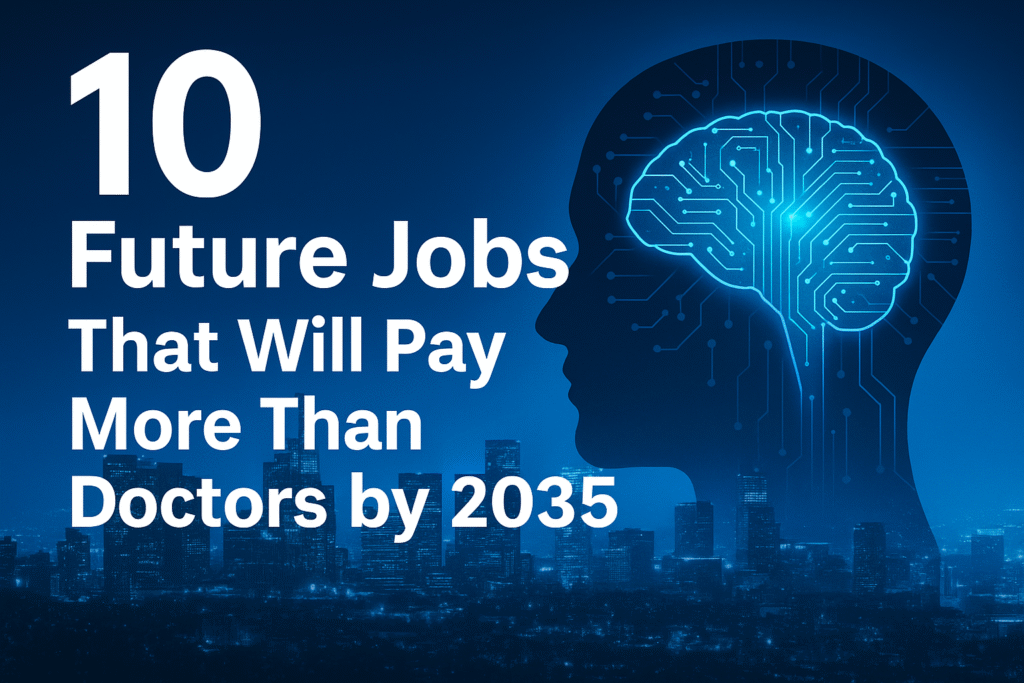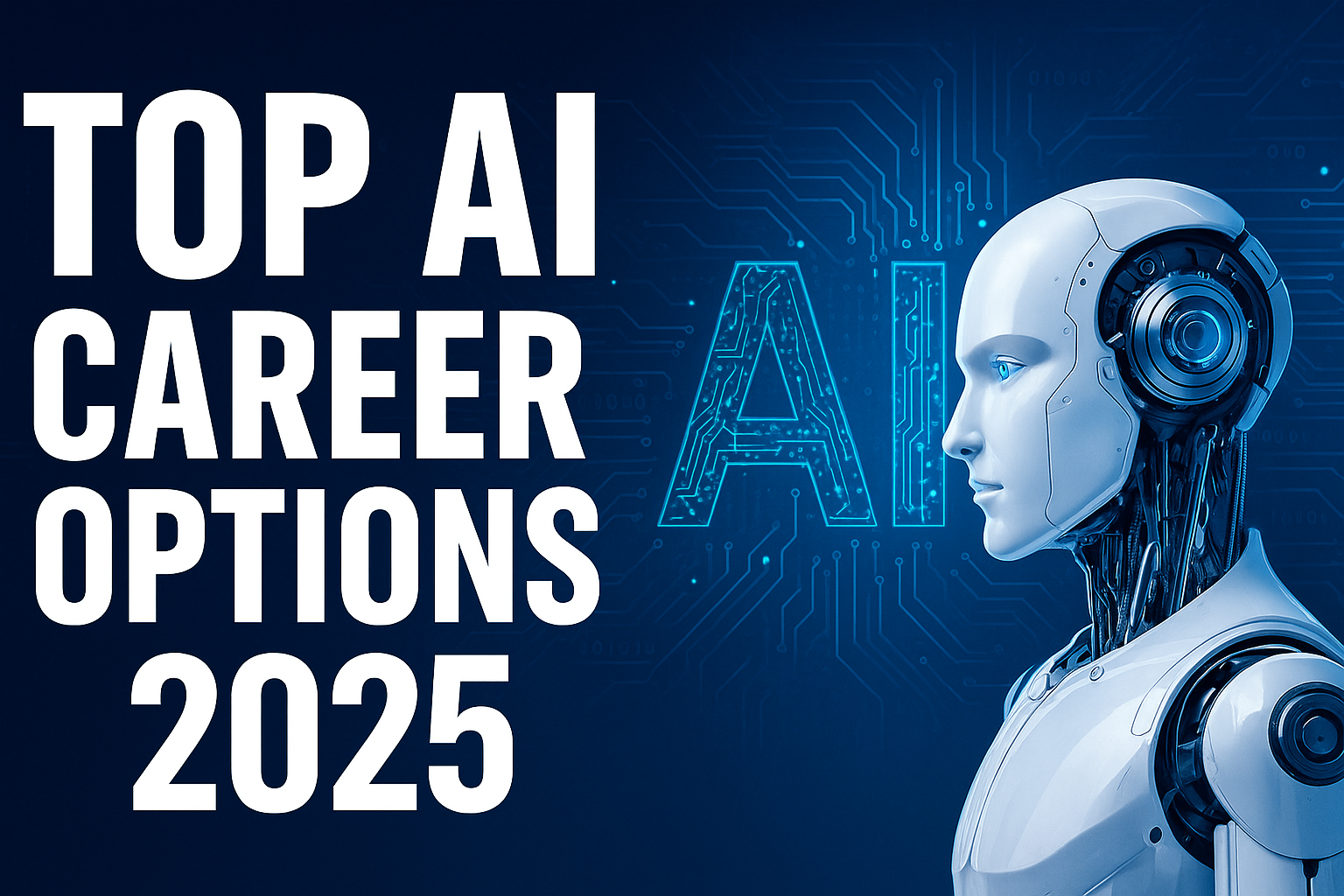
Introduction:
10 Future Jobs That Will Pay More Than Doctors by 2035
We live in a time where rapid technological advancement is changing the definition of “high-paying careers.” For decades, being a doctor symbolized the pinnacle of financial and social success. But as we look toward the next decade, the job market is undergoing a massive transformation. Emerging industries, driven by artificial intelligence (AI), robotics, biotech, space tech, and green energy, are creating roles that will soon pay more than traditional medical professions.
By 2035, several high-growth, high-demand careers may not just match but exceed the income levels of doctors. What’s more interesting is that these roles will also prioritize creativity, innovation, and real-world problem solving—skills that machines can’t easily replicate.
In this blog, we explore 10 future jobs that are predicted to out-earn doctors by 2035, based on data, trends, and expert forecasts.
1. AI Ethicist
As artificial intelligence becomes an integral part of life—from health diagnosis to policing—questions about AI bias, ethics, and transparency are unavoidable. That’s where AI ethicists come in.
What They Do: Evaluate and ensure ethical decision-making in AI models and machine learning systems.
Skills Required: Ethics, philosophy, AI knowledge, data privacy, human rights understanding
Estimated Salary by 2035: $350,000 – $600,000 annually
Why It Pays More: Tech companies will pay premium salaries to avoid legal risks, public backlash, and regulatory failures.
2. Quantum Computing Engineer
Quantum computing promises to solve problems beyond the capabilities of classical computers. From cryptography to molecular simulations, it’s a game-changer.
What They Do: Design, build, and test quantum algorithms and computing architectures.
Skills Required: Quantum mechanics, coding (Python, Q#), superconductors, cryptography
Estimated Salary by 2035: $400,000 – $750,000 annually
Why It Pays More: Extremely niche field with global demand in finance, pharma, and defense.
3. Climate Engineering Specialist
With climate change becoming more severe, climate engineering will be critical in mitigating environmental crises.
What They Do: Develop technologies to reverse or minimize the impact of climate change (e.g., carbon capture, geoengineering).
Skills Required: Environmental science, atmospheric physics, material engineering, sustainability
Estimated Salary by 2035: $300,000 – $550,000 annually
Why It Pays More: Governments and corporations will invest heavily to prevent climate disasters.
4. Neuro-Interface Engineer
Neural technology that connects the brain directly to machines or digital devices is progressing fast. Think Elon Musk’s Neuralink.
What They Do: Develop hardware and software that allow direct brain-machine communication.
Skills Required: Neuroscience, bioengineering, software development, cybernetics
Estimated Salary by 2035: $380,000 – $620,000 annually
Why It Pays More: Applicable in healthcare, defense, gaming, and communication. Demand will explode.
5. Space Resource Extraction Specialist
Mining on the moon or asteroids may sound sci-fi now, but several private space companies are already developing this technology.
What They Do: Extract, process, and manage resources from extraterrestrial bodies (e.g., rare metals).
Skills Required: Mining, space science, robotics, aerospace engineering
Estimated Salary by 2035: $500,000 – $1 million annually
Why It Pays More: High-risk, high-reward field essential for space colonization and tech development.
6. Virtual World Architect
The metaverse and immersive virtual environments are changing how we socialize, work, and play.
What They Do: Design and build interactive, engaging digital worlds for gaming, education, and remote work.
Skills Required: Game design, 3D modeling, VR/AR development, storytelling
Estimated Salary by 2035: $280,000 – $520,000 annually
Why It Pays More: Businesses and consumers will spend billions on virtual real estate and digital experiences.
7. Genomic Wellness Consultant
The future of healthcare is personalized and predictive. Genomics will allow treatment based on your DNA.
What They Do: Use genetic data to design personalized wellness, nutrition, and disease-prevention plans.
Skills Required: Genetics, biostatistics, medical tech, lifestyle medicine
Estimated Salary by 2035: $300,000 – $500,000 annually
Why It Pays More: Preventative care will be a trillion-dollar industry. People will pay for DNA-guided health solutions.
8. AI-Enhanced Lawyer
Legal tech is automating contracts, dispute resolutions, and legal research—but human lawyers will remain essential.
What They Do: Use AI tools to speed up casework, provide insight, and represent clients more efficiently.
Skills Required: Law, machine learning, legal research, data analysis
Estimated Salary by 2035: $350,000 – $650,000 annually
Why It Pays More: AI will make lawyers more productive, letting them handle more cases at higher value.
9. Robotics Swarm Manager
Swarm robotics refers to managing groups of robots that work together like ants or bees.
What They Do: Oversee, program, and coordinate robotic swarms in industries like agriculture, construction, and logistics.
Skills Required: Robotics, programming, systems design, AI
Estimated Salary by 2035: $320,000 – $580,000 annually
Why It Pays More: Cost-effective automation will boost demand across sectors.
10. Digital Identity Defender (Cybersecurity Expert)
As everything goes digital, protecting personal data becomes more vital than ever.
What They Do: Safeguard identities, prevent breaches, and develop secure digital infrastructures.
Skills Required: Cybersecurity, cryptography, AI, blockchain
Estimated Salary by 2035: $380,000 – $700,000 annually
Why It Pays More: Identity theft and cyber threats are rising. Digital safety is top priority for all.
Conclusion:
The future job landscape is undergoing a historic transformation. Many traditional careers, including medicine, will remain relevant—but several newer roles are poised to dominate both financially and socially. To thrive in 2035 and beyond, individuals must adopt a mindset of continuous learning, creativity, and tech fluency.
Whether you’re a student planning your career or a professional considering a pivot, now is the time to explore and prepare for these lucrative and meaningful paths. One thing is clear: the jobs of tomorrow demand more than just degrees—they require vision, adaptability, and innovation.
FAQs
Q1: Will these jobs require a college degree?
Some will, others may prioritize skills and certifications over formal education.
Q2: Are these careers accessible globally?
Yes. Many of these roles will support remote work and global teams.
Q3: Which job is the easiest to transition into from a non-tech background?
Genomic wellness, AI ethics, or cybersecurity offer bridge programs and flexible entry paths.
Q4: How to prepare now?
Start with online courses, certifications, internships, and networking in these fields.
Top 10 Emerging Technologies That Will Transform the World by 2030





Hi my family member I want to say that this post is awesome nice written and come with approximately all significant infos I would like to peer extra posts like this
👍 Thanks